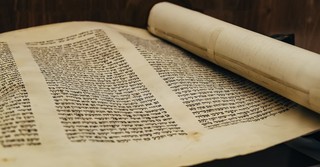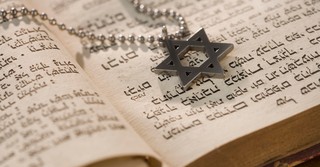What Is the Torah?
Share

It was during my first college-level Bible class when I heard the word Torah. At the time, I was not familiar with what that word actually meant. I was grateful for my professor’s explanation and have come to learn even more about the Torah since then. Perhaps like my experience many years ago, when you hear the word Torah, you are not quite sure what it means, and you might even feel a little confused by it.
In Judaism, the term Torah refers to the the first five books of the Old Testament. In Christianity, the first five books of the Old Testament are called the Pentateuch. Essentially, they mean the same thing. These first five books are attributed to Moses, and therefore, hold significant weight within Judaism. Other Jewish commentaries on Scripture, such as the Talmud, are sometimes considered part of the Torah, as well. Torah could also refer to the entire Hebrew Bible (or Old Testament), but generally the term implies the first five books.
For those who follow God, the Torah is at the center of life, understanding God, and knowing His laws.
Photo credit: ©Getty Images/Vladimir Zapletin
What Is the Torah?

The Torah is made up of the first five books in the Old Testament: Genesis, Exodus, Leviticus, Numbers, and Deuteronomy. The Torah includes poetry, instructions, narrative, and other writing styles to convey the story of God and humanity. All of God’s followers are encouraged to read, learn, and live the teachings of the Torah. In some orthodox Jewish synagogues, women are not allowed to read the Torah. Yet all are encouraged to learn it because the Torah impacts both community practices and individual life. In Judaism, the Torah is the focal point of Jewish life and religion.
During a Jewish service, the Torah is carried around the room, and then a passage from the Torah is read by a designated reader every week. It has always been an incredibly important part of Scripture for the Jewish people. We find in the New Testament that Jesus valued the Torah, and for Christians today, the first five books of the Bible (Torah or Pentateuch) remain foundational Scriptures in understanding God our creator, His faithful love, His covenants, and His plan of redemption for the world.
Why Is the Rest of the Old Testament Not Included in the Torah?
The Hebrew Bible is placed into three distinct sections: the Torah, the Nevi’im, and the Ketuvim. The Torah is the law, the Nevi’im is the prophets, and the Ketuvim is the writings. Tanakh is the acronym used to refer to all three of these sections of the Hebrew Bible. So even though only the first five books of the Hebrew Bible are included in the Torah, the rest of the books would either be part of the Ketuvim or the Nevi’im.
The Torah is unique in that it establishes God as the creator of all things, addresses the fall of humanity and evil in the world, it tells of the Israelites becoming God’s chosen people, and it introduces the covenants God made with His people. The Torah teaches the laws and guidelines of God, and truly captures how God loves and cares for His children, even when they are sinful and idolatrous.
Photo credit: ©Getty Images/Tetra Images
Why Was the Torah So Important for Jews (and Jesus!)?

In Jewish tradition, it is believed that Moses received the Torah from God on Mt. Sinai when he was there for 40 days. These first five books set the foundation of having faith in God and eventually, coming to anticipate and embrace the Messiah — Jesus Christ! Given from God to Moses, the Torah became profound in the life, thought, and hearts of the Israelites and was passed on through the generations. In His earthly ministry, Jesus affirmed both the value of the Torah and made clear that He was not abolishing the Scriptures but fulfilling them.
“Do not think that I have come to abolish the Law or the Prophets; I have not come to abolish them but to fulfill them. For truly I tell you, until heaven and earth disappear, not the smallest letter, not the least stroke of a pen, will by any means disappear from the Law until everything is accomplished. Therefore, anyone who sets aside one of the least of these commands and teaches others accordingly will be called least in the kingdom of heaven, but whoever practices and teaches these commands will be called great in the kingdom of heaven. For I tell you that unless your righteousness surpasses that of the Pharisees and the teachers of the law, you will certainly not enter the kingdom of heaven” (Matthew 5:17-20).
Jesus spoke openly about the significance of the Torah — its wisdom, its ethical and moral guidelines, and the unfolding of God’s plan for humanity’s redemption. Jesus did not lead people away from the Old Testament, and taught that it was still applicable to their lives and would remain so until all had been accomplished. Jesus also quoted the Torah when He was tempted in the wilderness. There is power in all Scriptures because they are the words of God. What we find in the Gospels is the consistent message that the Torah remains foundational, relevant, and vital Scriptures for all Christians. It is by knowing the Torah, and all Old Testament Scriptures, that we can fully understand the life of Jesus and His great sacrifice to save us.
Photo credit: Unsplash/Ben White
What Is the Central Theme of the Torah?

There are many themes throughout the Torah, yet God’s loving relationship with humanity remains the central theme of the Torah. From this central theme, we see various other major concepts emerge, such as, creation, God’s faithfulness, sinfulness versus righteousness, God as the only true living God, the story of God’s chosen people and His covenants with them, and the plan of redemption that God has put in place to save all creation.
In the Torah, as God’s loving relationship with humanity unfolds, there is a cycle that continues to play out. It is the cycle of Israel’s faithfulness, their idolatry and sinfulness, and the judgment and consequences as a result. We see this same cycle happening throughout the entire Old Testament. It may be easy for us today to read the Torah and judge the Israelites lack of faith and sinful tendencies.
However, as we learn about the Israelites, it is important to recognize that we can actually see ourselves in their story. God invites us to faithfulness, yet we sin and put other things before God, and end up suffering the consequences of our sins. The Torah invites believers to break the cycle, ridding their lives of idolatry and sin, to enjoy devotion to the Lord. Christians today live in Christ’s saving grace, knowing that Jesus’ death and resurrection conquered all death and sin. Through Jesus, our sins are removed and we are put in right standing with God. The Torah alludes to God’s plan of redemption that we know was set into motion when Jesus came.
The Torah Is Relevant for Us Today
The Torah does not have to be confusing or mistakenly believed to be irrelevant for Christians today. On the contrary, we find Jesus affirming the Scriptures and teaching that He had come to fulfill them, not abolish them. We find God’s precious words throughout the Torah which are relevant to us today for teaching, correcting, and rebuking (see 2 Timothy 3:16).
The Torah contains the first five books of the Bible, and the central theme of God’s loving relationship with humanity arises and points us to the redemption and salvation found in Jesus Christ. Jesus truly is the fulfillment of all Scriptures and gives life to those who believe in Him.
Photo credit: ©Getty Images/pcess609
